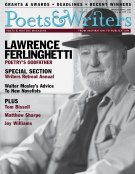Commerce is king." It's the kind of quote that makes literary writers and readers wince. But that's exactly what Roland Pease said in an interview with Poets & Writers Magazine in November 2001, after announcing that Zoland Books, the independent press he founded in Cambridge, Massachusetts, had ceased operations. Having published more than a hundred books of poetry and fiction, Pease said he was spending more time looking at the sales reports than at manuscripts. "And I knew that was a sign." He also said he doubted whether he'd "ever go into the trade again because it's just not really accepting of certain titles." Less than six years later, however, Pease is the fiction and poetry editor of Steerforth Press, the independent publisher in Hanover, New Hampshire, that acquired Zoland Books in 2003 and turned it into an imprint dedicated to paperback books of poetry, fiction, and memoir. This month Pease is launching Zoland Poetry with the first in a series of annual anthologies featuring poems, translations, and interviews. Included in the first collection are poems by Thomas Sayers Ellis, Ben Friedlander, Patricia Smith, Dean Young, and others. As for his pronouncement that "commerce is king," Pease's perspective seems to have softened a bit during the past six years. "Listening and learning will never go out of style," he says now. "Even as technology changes the culture and form of books, general readers will continue to turn to poetry at critical moments in their lives."
Readers for whom the decision between buying a twenty-five-dollar hardcover and a thirteen-dollar trade paperback is a no-brainer will appreciate Reader's Choice, a new program being offered by MacAdam/Cage, the nine-year-old independent press with offices in San Francisco and Denver. As before, all new MacAdam/Cage titles will be published in hardcover, but a select group of books chosen by the editors for Reader's Choice will be simultaneously published in trade paperback, allowing readers and booksellers to purchase either format. It's fairly common practice for university presses and art book publishers, but not for independent or even commercial presses, where the trade paperback edition of a particular title usually follows a season or two after the hardcover release. One of the first Reader's Choice books is A Circle Is a Balloon and Compass Both: Stories About Human Love (April) by Ben Greenman, who is an editor at the New Yorker.
French philosopher Jacques Derrida, the father of deconstructionist literary theory, is not for everyone. "A city must remain open to what it knows about what it doesn't yet know about what it will be," he writes. If pressed, many readers will simply roll their eyes and nod: "Yes, brilliant." But others are genuinely inspired by such gems and go on to create (not deconstruct) something exciting, like a small press. Tim Roberts and Julie Carr founded Counterpath Press in Denver last year in order to, among other things, support "communities of readers and artists who are interested in linguistic and visual interventions in contemporary global culture" and "encompass new conceptions of what compelling work can mean." Yes, brilliant. But like the Derrida quote above (which is prominently displayed on Counterpath's Web site), the press's goals have had some tangible results. Last month brought the publication of its first three books—the poetry collections The Stripping Point by Brian Henry and Daily Sonnets by Laynie Browne and The Cry at Zero: Selected Prose by Andrew Joron. The press will publish four to ten titles annually and will focus on poetry, fiction, drama, cross-genre work, literary and cultural theory and criticism, and translation. Roberts says Counterpath is "driven by a broadly conceived mission." Indeed, a press must remain open to what it knows about what it doesn't yet know about what it will be too.
Kevin Larimer is the senior editor of Poets & Writers Magazine.









